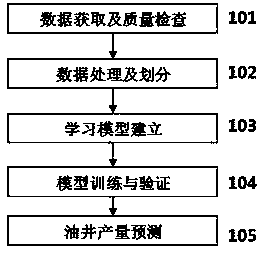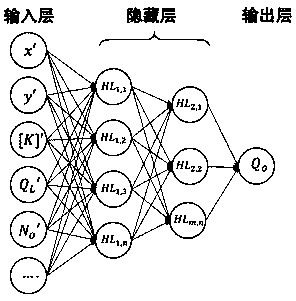Oil well yield prediction method based on deep learning algorithm
A deep learning and production forecasting technology, applied in the field of oil well production forecasting based on deep learning algorithms, can solve problems such as limitations, forecast results need to be improved, and data cannot be used to analyze data.
- Summary
- Abstract
- Description
- Claims
- Application Information
AI Technical Summary
Problems solved by technology
Method used
Image
Examples
Embodiment Construction
[0031] In order to make the above and other objects, features and advantages of the present invention more comprehensible, the preferred embodiments are listed below and shown in the accompanying drawings in detail as follows.
[0032] like figure 1 as shown, figure 1 It is a flow chart of the oil well production prediction method based on the deep learning algorithm of the present invention.
[0033] Step 101, data acquisition and quality inspection
[0034] For the target research area, the following raw data were obtained from the database, well location parameters (plane abscissa, plane ordinate), layer physical parameters (permeability, oil saturation), monthly production dynamic data (working hours, dynamic fluid level, monthly liquid production, monthly oil production, accumulative oil production, accumulative water production).
[0035] The abscissa (x) and ordinate (y) of the well location plane correspond to the underground plane position of the oil well. Usually,...
PUM
 Login to View More
Login to View More Abstract
Description
Claims
Application Information
 Login to View More
Login to View More - R&D
- Intellectual Property
- Life Sciences
- Materials
- Tech Scout
- Unparalleled Data Quality
- Higher Quality Content
- 60% Fewer Hallucinations
Browse by: Latest US Patents, China's latest patents, Technical Efficacy Thesaurus, Application Domain, Technology Topic, Popular Technical Reports.
© 2025 PatSnap. All rights reserved.Legal|Privacy policy|Modern Slavery Act Transparency Statement|Sitemap|About US| Contact US: help@patsnap.com



